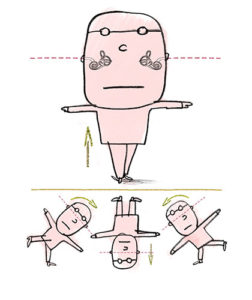BPPV (Benign Paroxysmal Positional Vertigo) is a false sensation of spinning upon changes in the position of the head, arising from a problem in the inner ear. This is the most common cause of vertigo (intense dizziness). It can also happen when you turn your head quickly and bending or tipping your head back or up or down. In most of the cases, it appears in people after the age of 40. But here comes the question, can BPPV go away by itself or not?
If you need more information or you have a question regarding BPPV, you can discuss it with our HearingSol healthcare professionals, just give us a call on +91-9327901950. We are always here to help you.

However, some people develop BPPV following an injury to the ear, or infection in the inner ear. Inside the inner ear canals, tiny calcium “stones” are responsible to maintain the balance of our body. Normally, when we move a certain way, these stones move in that part of the inner ear. But things like infection or inflammation in the ear can stop stones from moving as if they should. It sends a false message to the brain and likewise, it is responsible for vertigo.
Mostly, the length of the persistence of vertigo symptoms depends on the cause. Generally, vertigo will go away on its own within 24 hours. Similarly, without treatment, BPPV usually goes away by itself within a few weeks. But it can come back at a later date.
How is BPPV treated?
Your doctor can do only one of two procedures that are going to work for most cases of BPPV. These procedures are known as Epley maneuver and Semont maneuver. If you are not willing to take treatment or in any case treatment doesn’t work, BPPV usually goes away itself within a few weeks passes. Over time, your brain likely gets used to of the confusing signals it is getting from the inner ear. Either way, you can also try some of the simple exercises that are going to train your brain for getting used to of the confusing vertigo signals.
Medicine will be helping you with severe nausea and vomiting.
Be more careful while doing the exercises so that you don’t hurt yourself.
- Try to avoid driving and cycling if there are any changes you can be stricken by vertigo and you lose control.
- At home, try to keep floors as well as walkways free from clutter so that you don’t trip.
- Places at great heights should be avoided.
- Avoid using tools or machines that can be dangerous if you get dizzy or lose balance.
